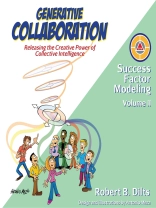Working together with others in groups and teams is an increasingly common and important part of modern business and contemporary life. High performing teams demonstrate the characteristic of collective intelligence. Collective intelligence relates to the ability of people in a team, group or organization to think and act in an aligned and coordinated fashion
The fruit of effective collective intelligence is what is known as generative collaboration. Generative collaboration involves people working together to create or generate something new, surprising and beyond the capacities of any of the group members individually. Through generative collaboration, individuals are able to utilize their abilities to the fullest and discover and apply resources that they did not yet realize that they had. They draw new ideas and resources out of each other. Thus, the performance or output of the group as a whole is much greater than it would be if the individuals were working by themselves.
This book is for people who want to increase their capacity for working effectively together with others and to experience the excitement, satisfaction and power of generative collaboration.
Cuprins
Introduction – Overview of Success Factor Modeling
Key Levels of Success Factors
Ego and Soul
The Dynamic Between Passion, Vision, Mission, Ambition and Role
The COACH State – Integrating Ego and Soul into a ‘Holon’
Next Generation Entrepreneurship
The SFM Circle of Success TM
Making an Elevator Pitch
The SFM Mindset Map
The Influence of the ‘Field of Innovation’ on the Circle of Success
Chapter 1-Making the Pie Bigger: Bringing Collective Intelligence into Your Circle of Success
Collective Versus Collected Intelligence
Creating Collective Intelligence
Holons and holograms
Task Significance and Performance
Benefits and Applications of Collective Intelligence
The SFM Collective Intelligence Model
Mastermind Groups – An Example of Applied Collective Intelligence
Collaboration Catalysts
SFM Collaboration Catalysts:
Creating a ‘COACH Container’
Multi-Level Introductions
Setting Intention
Fostering a ‘Field’ of Co-Sponsorship
Exploring and Sharing Best Practices through Success Factor Modeling
Chapter 2-Collective Intelligence and Generative Collaboration
Collaboration is Essential for a Successful Venture
How Can Twenty People Outperform One Thousand?
Success Factor Case Example: Cross Knowledge
Dynamics of Generative Change
SFM Collaboration Catalysts:
Developing a Generative Performance State
Promoting Synergy Through Intervision
Applying Intervision to Problem Solving
The Importance of ‘Second Position’ for Generative Collaboration
SFM Collaboration Catalyst: Collaborator Attribute Analysis
Chapter 3-Generative Collaboration and ‘Disruptive Innovation’
Dynamics of Disruptive Innovation
Open Innovation
Weak Signal Detection: ‘Frogs Versus Bats’
Success Factor Case Example: Stefan Crisan – EDHEC Master in Management
The Power of Integrating Multiple Perceptual Positions
SFM Collaboration Catalysts:
Creating Win-Win Collaborations Through Third Position
SFM Collaborator Audit
Moving to Fourth Position – Forming a Relational Field
Identifying Resonance for Task Significance
Collective Creativity Catalysts
Chapter 4-Making Something from Nothing: Forming a Generative Venture Community
The Story of ‘Stone Soup’
Characteristics of a Generative Venture Community (GVC)
Swarm Intelligence
Success Factor Case Example: Randy Williams-The Keiretsu Forum
Characteristics of a ‘Winning’ Culture
SFM Collaboration Catalyst: Group Affirmation Exercise
How to go from being ‘nobody’ to becoming ‘somebody’
The SFM Collaboration Spiral
SFM Collaboration Catalyst: Modeling Successful Collaboration
SFM Collaboration Catalyst: Preparing for a Generative Relationship
Success Factor Case Example: John Dilts – Founder, Maverick Angels
SFM Collaboration Catalyst: Dream Guardians Exercise
Chapter 5-Dynamic Teaming
Lessons in Dynamic Teaming from Geese
Flocking and the Power of Process
Lessons in Dynamic Teaming from the Battle of Midway
Dynamic Team Development
Success Factor Case Example: Comau Pico Custom Products Team
SFM Collaboration Catalysts:
Basic Meeting Format
Resource Mining
Aligning Roles Within a Common Vision
Modeling Dynamic Teaming Success Factors
Making a Dynamic Teaming Scorecard
Chapter 6-Activating the Wisdom of Crowds
Developing Wisdom
The Wisdom of Crowds
Conditions Needed to Produce Wise Crowds
Google’s Quest for the Perfect Team
Six Steps for Activating the ‘Wisdom of Crowds’
SFM Collaboration Catalyst: Shifting from CRASH to COACH State
SFM Collaboration Catalyst: Tetra Lemma Group Process
Success Factor Case Example: Drew Dilts – Benin Moringa Farm and Bee Keeping Project
Conclusion
Review of Key Themes
A Concluding Example of the Power of Collective Intelligence
Closing Reflections
Despre autor
Antonio Meza has been drawing cartoons ever since he can remember, but his professional cartoonist work started only recently in his life.
A native of Pachuca, Mexico, Antonio is a Master Practitioner and a Trainer of Neuro-Linguistic Programming (NLP). He has a degree in Communication Sciences from Fundación Universidad de las Américas Puebla, a Masters degree in Film Studies from Université de Paris 3 -Sorbonne Nouvelle, a diploma in Cinema Scriptwriting from the General Society of Writers in Mexico (SOGEM), and a diploma in Documentary Films from France’s École Nationale des Métiers de l’Image et du Son (La Fémis).
He had participated in animated cartoons startups in Mexico before moving to France where he works as a consultant, coach, and trainer, specializing in creative thinking and collective intelligence.
Antonio is also an experienced public speaker member of Toastmas- ters International. In 2015 he was awarded best speaker at the International Speech Contest of District 59, covering South-West Europe, and reached the semifinals at international level.
His cartoons and illustrations have been published by the Université Pantheon-Assas (Paris 2), he co-authored three books (as illustrator); two with Jean-Eric Branaa: ‘English Law Made Simple’ and ‘American Government Made Simple’ published by Ellipses in Paris and ‘Les Vrais Secrets de la Communication’ with Beatrice Arnaud.
He also uses his skills as a cartoonist and trainer to collaborate in seminars, conferences and brainstorming sessions as a graphic facilitator, and to produce animated videos to explain complex information in a fun way.
Antonio has illustrated the three volumes for the Success Factor Modeling series in collaboration with Robert Dilts.












